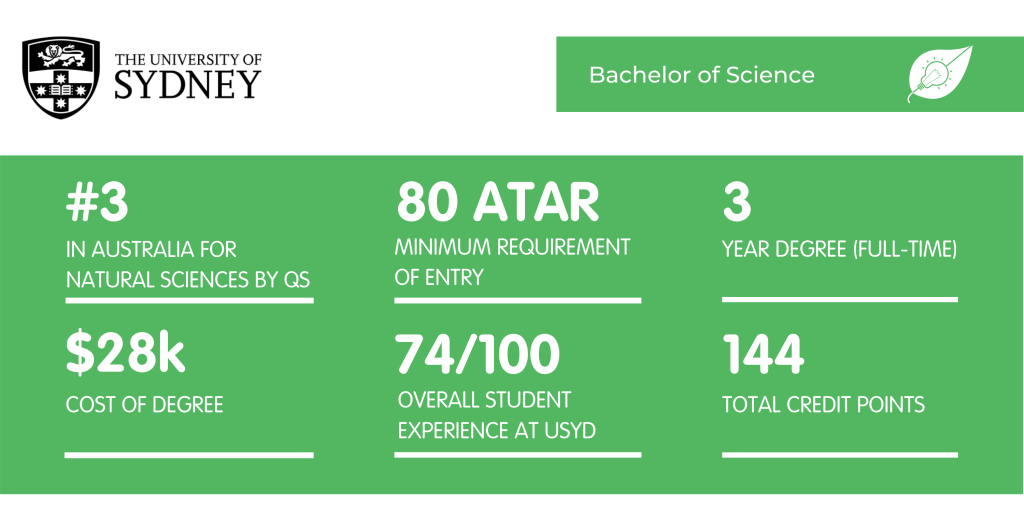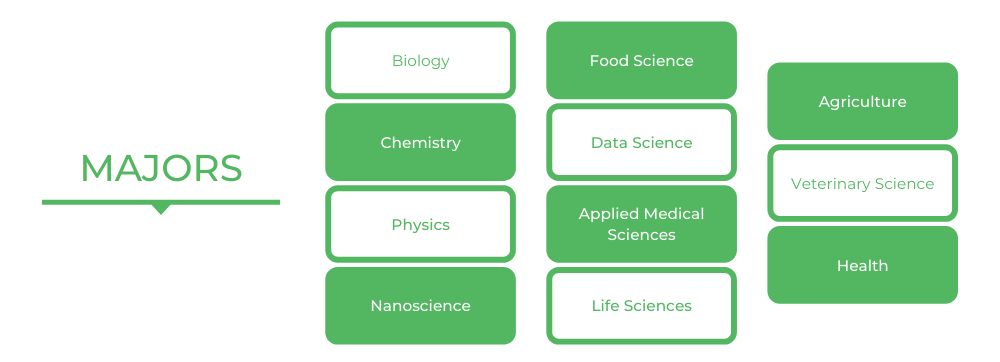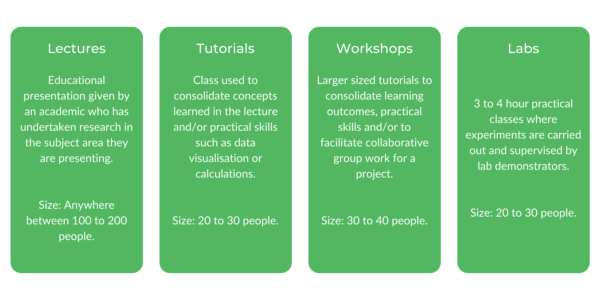
Interested in pursuing a Bachelor of Science at USYD?
Here is a sneak peek of what this degree is all about, including its entry requirements, majors, staff, class culture, assessments and more!
So, let’s get started!
What is a Bachelor of Science at USYD?
Core Units and Majors
How to Get into a Bachelor of Science at USYD
What’s the Teaching Format?
What’s the Faculty and Culture Like?
What is a Bachelor of Science at USYD?
A Bachelor of Science at USYD provides a gateway to study and experience many areas of science, ranging from the basic chemistry, physics and mathematics subjects to the more niche schools such as veterinary sciences, geosciences, psychology and even the history and philosophy of science!
It is a highly flexible degree as you can choose from the many branches of science that Sydney Uni offers! If you’re passionate about science but just aren’t sure about what you’d like to specialise in, this degree allows you to experiment with different branches before committing to one.
Anyone who has a passion for critical thinking and solving problems to real world situations would find this degree very rewarding. If Biology, Chemistry or Physics are subjects you enjoy studying, the units you get to study for a Bachelor of Science will pique your interest too!
Career Prospects
Studying a science degree can give you the critical thinking, valuable data analysis, research and communication skills that many different sectors are looking for!
Because of this, the career prospects for science are fairly diverse, flexible and ever-changing with the current priorities of our world. You can find employment in many work areas such as:
- Research
- Health practice
- Government policymaking
You could even continue onto further studies. For more information about postgraduate studies for a Bachelor of Science, you can look here!
Check out the various careers you can pursue with a Bachelor of Science here!
Studying a Bachelor of Science at Other Universities
USYD isn’t the only university that offers this degree and making a choice about where you’ll study isn’t just one you make on the spot. If you’re thinking about which university will best suit your needs, you can check out what it’s like studying a Bachelor of Science at:
Core Units and Majors
USYD’s Bachelor of Science degree provides an expansive range of majors and units to choose from. With more than 40 majors from the Faculty of Science and shared majors from other faculties across the university, USYD allows you to find a path that’s designed for you.
Some popular majors include:

You can find out about more majors and minors here!
How do you choose your majors?
Just like any other degree, the first step is to read the information about your major of interest in the current handbook (that is linked above). Once you’ve decided which major you want to enrol in, you can key this into your Sydney Student website and choose the units you want to study for the year.
Remember, the first year is all about testing what’s right for you! So don’t feel afraid to change your first semester majors in your second semester if you feel like something else suits you better.
What are the Core Units?
To complete a Bachelor of Science degree at USYD, you would need to complete 12 units of Mathematics that include Linear Algebra, Statistics and Calculus which can be done at any time during your 3 year degree.
Other than this, the core units vary according to the majors and minors you have chosen. To find out what core units are allocated to your major or minor, you can check out the handbook here!
What’s a Biology Major like?
A Biology Major covers everything having to do with life, investigating plant, animal and human biology that ranges from a microscopic to an ecosystemic scale.
In the first year, biology subjects tend to provide an overview of all areas of biology, starting from genetics to ecosystems in its core unit BIOL1007 Molecules to Ecosystems.
These subjects start to get more specialised in second year with units such as BIOL2021 Zoology, BIOL2030 Botany, GEGE2001 Genetics and Genomics and IMMU2011 Immunobiology. You will also undertake BIOL2022 Experimental Design and Analysis to train your laboratory skills.
By third year, you are able to choose a particular field to study in. These can range from BIOL2008 Marine Field Ecology to BIOL3010 Tropical Wildlife Biology, depending on which environment you’re interested in.
There’s also the BIOL3888 Interdisciplinary Project, where you will be working with science students from other disciplines to solve real life problems! How exciting!
What’s a Chemistry Major like?
A Chemistry Major allows you to explore both the theoretical and practical application of chemistry that make up our natural and physical world.
Chemistry in the first year will start you off with basic concepts such as Radiation Chemistry, Thermodynamics and Organic Chemistry in CHEM1111.
Then like other sciences, things start getting more specialised in second year, opening up pathways to industrial CHEM2522 Sustainable Chemical Manufacture, organic CHEM2523 Chemistry of Biological Molecules and even the dynamic CHEM2524 Chemical Physics.
In third year, you delve deeper into any of these pathways and learn to apply them in real life through units such as CHEM3112 Materials Chemistry, CHEM3115 Synthetic Medicinal Chemistry and CHEM3117 Molecular Spectroscopy and Quantum Theory. There’s also the option of an interdisciplinary unit CHEM3888.
Are there internship or work experience opportunities?
There are many internship and work experience opportunities for science students at Sydney Uni! However, you do need to actively dig into where these opportunities may be hidden as they are not heavily advertised.

Internship programs such as Sophia’s allow you to work with companies from all over the world! Within teams, you get to learn new analytical techniques that aren’t normally used in university labs such as gas and liquid chromatography.
While the Year In Industry Program is only open to third year Chemistry majors, you can check out Sydney Uni’s CareerHub page which is abundant in internship and work opportunities!
How to Get into a Bachelor of Science at USYD
The Bachelor of Science degree at USYD requires an ATAR of 80 for guaranteed entry. Alternate pathways into this degree can be found here!
Curious about the top universities for a science degree in Australia? Check out our list here!
Are there any prerequisites?
As the Bachelor of Science degree requires you to complete 12 credit points of mathematics, you need to achieve at least a Band 4 in mathematics or mathematics advanced or a Band E3 for mathematics extension 1 or 2. These prerequisites also apply to other curriculums such as the IB and WACE which can be found here.
What scholarships are available?
There are many scholarships available for new or current students entering the Bachelor of Science degree which can be found here.
What’s the Teaching Format?
A Bachelor of Science at USYD is delivered through lectures, tutorials, workshops and labs which can vary in size and duration with their respective majors. The university also follows the semester-system, so there will be two sessions of study within a year.

The content covered in lectures often depend on your subjects that are determined by your majors, but you can expect to be surrounded by more than 100 students when you attend them.
In tutorials or workshops at Sydney Uni, you will be working with tutors to refine your problem solving skills, involving calculations, short answer questions or just working on upcoming assignments. A tute will normally have around 15 to 20 students in the class, while workshops will have 30 to 40 people.
For labs, the type of experiments that you will need to perform will be based on the subjects you take too, but these classes will generally have 50 to 60 students. For example, in Chemistry you would most likely be performing titrations while in Biology you will carry out dissections.
What is class like in first year?
In the first year of science at Sydney Uni, students often start with the basic science units such as Biology, Chemistry and Physics before branching out to their own specialised area of studies. These units are offered in four levels to accommodate to the student’s level of knowledge and passion for science:
- Fundamental: For students who did not do science as a subject in high school
- Regular: For students who have done science as a subject in high school
- Advanced: For students who like to learn more for that unit
- Special studies program: For students who enjoy more challenging concepts and practicals
Both the fundamental and regular stream consist of 3 x 1 hour lectures per week with a 3 hour lab each week. Some subjects have 1 one hour tutorials each week for first years.
Meanwhile, in the advanced level stream, students often perform more assessments and/or attend 1 more lecture per week than the regular/fundamentals stream.
The special studies program is designed to be a bit more challenging by introducing more complex but interesting practicals and assessments. The number of lectures and duration of the lab may vary according to the unit.
What about second and third year?
In second year, these multi-level units are still offered in most of the science units with longer 4 hour lab practicals and 2 to 3 lectures during the week. Don’t worry, as some of the labs and workshops will be scheduled in alternating weeks, so you don’t get too sick of the lab work!
Third year is where things get interesting! Often in the second semester, you will be placed in Science Interdisciplinary Projects where you will be working with people from different majors to find solutions to a real life problem!
These units often have shorter contact hours with 2 to 3 one hour lectures and a 2 to 4 hour workshop during the week, as you would need to find time after classes to work with your group members.
How many hours do you have to spend at university?
Due to long practical labs and multiple lectures across the week, science students tend to have higher contact hours than other degrees with around 6 to 7 contact hours per subject. If you are taking full-time study with 4 science units, this will add up to around 24 contact hours a week.
While classes for science students can span across five days, you can plan your timetable in a way that you only need to come to campus for 3 or 4 days!
What are assessments like?
Assessments in science at Sydney Uni can vary according to the subject, but often consists of practical lab assessments, scientific reports, group presentations and final exams. How many of these assessments you get in a semester can also depend on the subject.
For practical lab assessments, you will be assessed on your lab technique, practical design and problem-solving skills (weighted around 15-20%). This often occurs once a semester.
Scientific reports are a key part of your science degree! In the first year, these reports can be assigned shortly after lab reports which are spread across the semester and add up to 20% of your final weightage.
In second and third year, scientific reports tend to be longer and require more data analysis and literature research. These scientific reports can be an individual assessment (1000 to 2000 words) or assigned as group work (2000 to 3000 words) and will use Canvas/Turnitin to submit your work.
You will also be asked to do more group presentations that summarise your findings in a fun and meaningful way! This will often weigh 10-15%.
As for final examinations, first years tend to have more exams than the later years. These exams usually consist of multiple choice questions as well as short response questions that could test your theoretical and/or practical knowledge.
What are the skills you develop?

The key skills that you learn from USYD’s Bachelor of Science degree are highly sought after by various employers.
Critical thinking is very important for a science graduate, especially when you have to create innovative solutions to analyse, identify and attempt to resolve real life problems.
Sydney Uni also equips you with the analytical skills in data and literature that you need for more evaluative and holistic research.
As collaborative work is often encouraged in the science community, this degree will help you refine your communication and teamwork skills, both written and spoken. Through presentations and science reports, you will learn how to present yourself as a professional academic and an effective contributor to the world of knowledge.
Resources for Students
We all know maths isn’t the easiest subject! With maths being compulsory to study within a Science degree, the Maths Learning Centre at Sydney Uni is a great place to close any gaps in your understanding. There are often tutors present to help you out with your work or upcoming assignments.
Otherwise, don’t feel afraid to approach your lecturers or tutors after a class or shoot them an email!
What’s the Faculty and Culture Like?
The Sydney Uni science cohort is very big and diverse! Though it’s impossible to get to know everyone, science students are generally very friendly and pretty chill. The science staff are also very nice people who are passionate about their subject and their students and sometimes, can get pretty creative with their teaching!
Culture
Science isn’t an easy subject, so students often readily support and work with one another to get by the deadlines and assessments.
You don’t have to worry much about your group members for assignments because most people at Sydney Uni like to strive for the best results. While classes can be fairly quiet, downtime between experiments is a great time to get to know your lab partner.
Composed of diverse students from different backgrounds, the science cohort is a rich array of fresh new perspectives and interpretations on the workings of life and earth.
It can be a bit difficult to maintain friendships in a large cohort, especially in first year where most subjects are composed of students from various majors. However, as you transition into your specialised areas, it will become easier to find a group of friends who share the same passions, interests and units as you!
Societies
USYD Societies are a great way of making new friends! Science students are lucky as there are societies for almost every major in science.
While there are societies such as SciSoc, ChemSoc, PhySoc and BioSoc which cover the general areas of science, there are also more niche societies such as the Nutrition Society, Astronomy Society or Health Society that welcomes anyone who is interested!
There are also societies like Women in Science and AISEC that are geared towards building your career skills.
Check out the full list of Sydney Uni’s societies here!
Kate Lynn Law graduated in 2017 with an all rounders HSC award and an ATAR of 97.65. Passionate about mentoring, she enjoys working with high school students to improve their academic, work and life skills in preparation for the HSC and what comes next. An avid blogger, Kate had administered a creative writing page for over 2000 people since 2013, writing to an international audience since her early teenage years.


